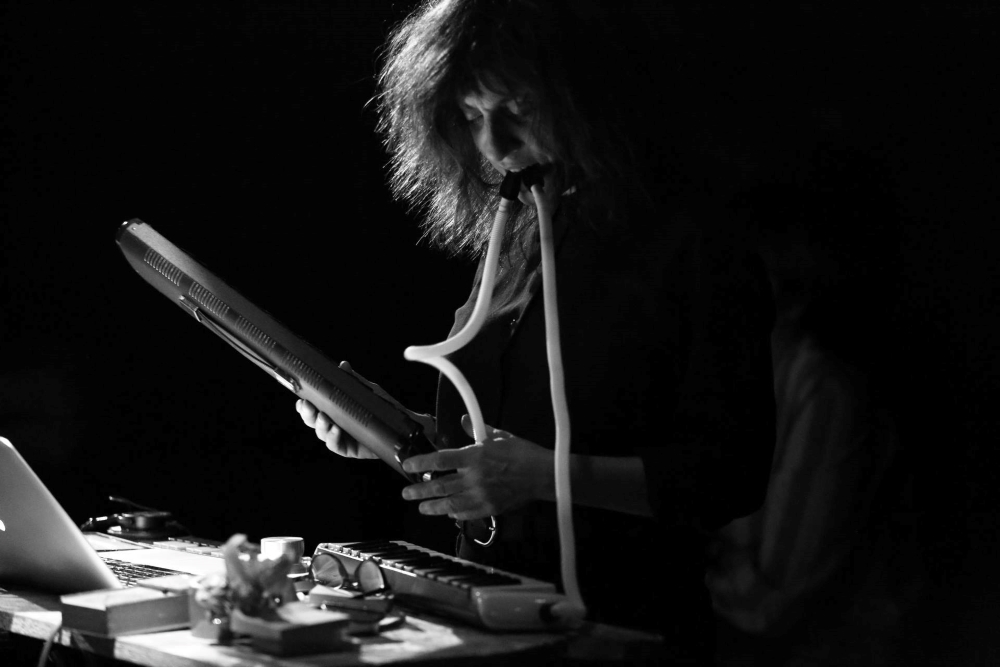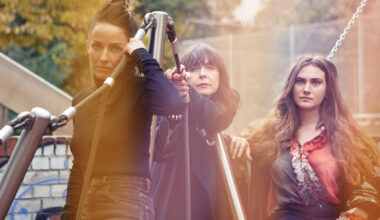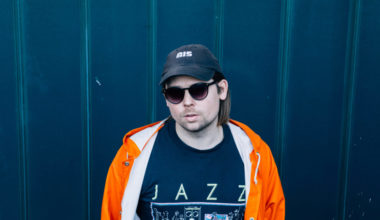Andrea Parkins is a Berlin-based sound artist, composer, and electroacoustic musician who engages with interactive electronics as compositional/performative process. She is known for her pioneering gestural/textural approach on her electronically processed accordion, and investigation of embodiment and chance with her custom-designed software instruments.
Parkins’ projects encompass multi-channel fixed-media installations, electronic music pieces, electroacoustic solo and ensemble compositions; and sound for contemporary dance, experimental film and intermedia performance. She performs as a solo artist, and has collaborated with artists such as Ute Wassermann, Magda Mayas, George E. Lewis, Nels Cline, Matthew Ostrowski, The Necks, Vera Mantero, The Body Cartography Project, Abigail Child, and many more. Her performances and installations have been presented at the Whitney Museum of American Art, Café Oto, The Kitchen, Experimental Intermedia, Kunsthalle Basel, Musée d’Art Moderne et Contemporain, Strasbourg, among others. Festival appearances have included NEXT/Bratislava, Cyberfest/St. Petersburg, All Ears/Oslo, Jazz im Augusto/Lisbon, Music Unlimited/Wels, and many others.
Since 2002, Parkins’ ongoing project has been her series of interactive audiovisual performance works inspired by Rube Goldberg’s circuitous machines. In addition, recent projects include her 2016 performance/installation, ‘Two Rooms, Variation 1’, for 40 loudspeakers and ‘Solo Performer’, which premiered at Akousma Festival in Montreal; her fixed-media installation, ‘Studio Drawing 27-4-19’ for 25 Loudspeakers, presented in 2020 at FRST Mini-Festival of Electroacoustic Music in Visby, Sweden, and her series of large-scale amplified performance drawings. Parkins has been an invited resident artist at Rauschenberg Residency in Captiva, Florida; Elektronmusikstudion (EMS), Stockholm; Harvestworks Digital Media Arts Center (NYC); and by Frei und Hanseastadt Hamburg Kulturbehoerde. Her recordings are published by Important Records, Infrequent Seams, Confront Recordings, Atavistic, Henceforth Records and Creative Sources; and she can be heard as a contributor on numerous other labels.
FACTS:
1: Now is not a good time to be glib about anything.
2: Humour helps.
3: To quote Gertrude Stein: “Yes but how.”
QUESTIONS:
1. What is the biggest inspiration for your music?
The women pioneers of electronic music, especially Maryanne Amacher; and experimental cinema from the mid- to late-20th century.
2. How and when did you get into making music?
There were some strong influences that led me there. I came from a family in which almost everyone played music. Perhaps more importantly, I listened to records all the time as I was growing up, and from wildly divergent styles and genres: somehow mostly emphasizing dissonance and idiosyncratic timbres. Also, I lived in the countryside, listening by day to the sounds of insects and the occasional airplane passing overhead, and by night to far-off traffic and trains coming through. All this sound affected and compelled me, so making music/sound was something I wanted and needed to do. I studied classical piano through my late teens, and then moved to Boston, where I went to art school, played in rock bands, and studied improvisation with an amazing teacher. By the time I was in my early 20s, I was composing tape music on reel-to-reel multi-track recorders; and improvising with piano, amplified accordion, and different types of electronic instruments.
3. What are 5 of your favourite albums of all time?
Jimi Hendrix – Axis: Bold as Love
Thelonious Monk – Monk (Prestige)
MEV/AMM – Live Electronic Music Improvised
OHM: The Early Gurus of Electronic Music
Stevie Wonder – Innervisions
4. What do you associate with Berlin?
The collaborative emphasis of the music community that I’ve become part of here. I also associate it with the memory of my first visit here in the 1980s. I think a lot about the transitions in politics and culture that have taken place here between then and now. I am still learning about that.
5. What’s your favourite place in your town?
The lakes and outdoor swimming pools.
6. If there was no music in the world, what would you do instead?
I would listen.
7. What was the last record/music you bought?
Eliane Radigue – Feedback Works 1969-1970.
8. Who would you most like to collaborate with?
I’ve been lucky to collaborate with many great musicians, choreographers, filmmakers and interdisciplinary performers over the years. I hope that continues. Currently, I’m interested in collaborating with acoustic situations: spaces, places, environments.
9. What was your best gig (as performer or spectator)?
As a spectator, there have been so many, among them: King Sunny Ade in Boston during his band’s first US concert tour in the 80s; George Clinton and Parliament Funkadelic at Tramps, NYC in the mid-90s; and just several years ago, Patrice Chéreau’s production of Janecek’s ‘From the House of the Dead’. with New York Metropolitan Opera. As a performer, two that come to mind are my first concert in Europe, in 1994, at Het Apollohuis in Eindhoven; and the 2016 premiere of my piece ‘Two Rooms, Variation 1, for 40 Loudspeakers and Solo Performer’, at Akousma Festival in Montreal.
10. How important is technology to your creative process?
Electronic technology has been crucial to my creative process since the 1980s, when I started experimenting with synthesizers and tape recorders, and also became fascinated by the sounds that I could make by plugging my accordion into a chain of cheap guitar effects pedals and outputting the result through a Fender Twin Reverb amp. Since then, I’ve gone on to co-create and develop a custom-built software instrument that has become my primary tool for composing, improvising, and making sound installations. I work with it nearly every day.
11. Do you have siblings and how do they feel about your career/art?
Yes, I have two siblings. They are artists and musicians, and are supportive of what I do.
Andrea Parkins will be performing alongside Yorgos Dimitriadis at Jazzwoche. The concert takes place at Club der Polnischen Versager, Ackerstraße 168, Berlin on Sunday, 16 August at 21:30 CET. Tickets are 15 EUR.
Photo © Carl Krugel


